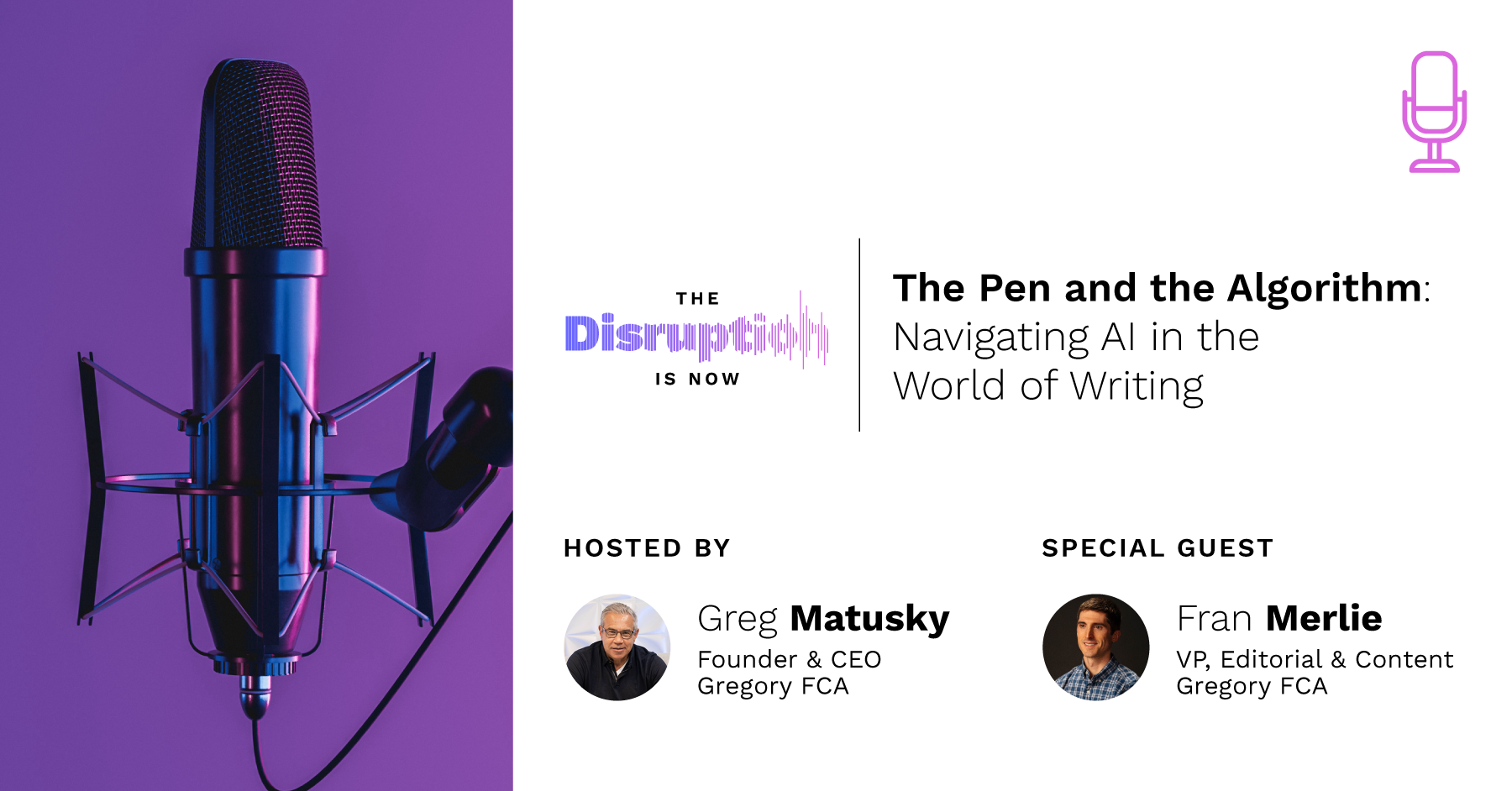AI writing tools have been greeted with both awe and apprehension. Some writers and communicators are diehard fans of AI and have never felt more productive. Others remain stringent skeptics who mock AI output and remind everyone of the human role in creativity.
The reality is far more nuanced, as revealed in the latest episode of “The Disruption Is Now.”
Host Greg Matusky, an evangelist for AI’s potential to augment human skills, speaks to Gregory FCA’s VP of Editorial and Content, Fran Merlie, who takes a more measured approach to AI tools.
In this wide-ranging back-and-forth, Greg and Fran share their unfiltered thoughts on how AI is transforming the writing process, the job market, and human creativity. Along the way, they share how they’re using AI in their work, their approaches to prompting, how to improve AI output, and advice for students graduating into careers that will be fundamentally transformed by AI.
It’s a conversation that challenges communicators to rethink their relationship with AI and explore its potential to enhance creativity and benefit humanity.
Watch now:
Key takeaways:
AI writing tools boost productivity when used thoughtfully
AI tools like Claude and ChatGPT can improve writing efficiency and quality when given clear, detailed prompts and input.
For example, providing hierarchical messaging and specific facts helps the AI stay on track and avoid hallucinating. Giving the AI examples of high-quality writing to match, whether your own or from other sources, can also elevate results by providing a target to emulate in terms of voice, tone, and structure.
The key is crafting prompts that include your unique thoughts, perspectives, and voice as well as sufficient guardrails and direction. When used thoughtfully, AI can augment human creativity and writing output.
AI enables new creative pursuits for more people
AI can help aspiring musicians generate original songs, or empower anyone to become the showrunner of their own TV series.
While AI-generated content often lacks the nuance and originality that comes from human creativity, AI can be a powerful collaborator for the many people who lack the time or skill to make art.
At the same time, human skills like critical thinking and editing will be all the more important as creators seek to maximize the benefits of this technology.
AI will invent new jobs and transform existing ones
AI may disrupt some professions, but it has the potential to create new jobs and careers that we still can’t imagine. But every new technology disrupts some work while creating new jobs and even new industries. The key is flexibility and following opportunities as they arise, blending the strengths of AI with emotional intelligence, experience, relationships, and other areas where humans excel.
Human guidance is crucial to oversee AI writing quality and ethics
Since AI systems reflect the data they’re trained on, developing skills to edit and fact-check AI writing is important.
Human oversight plays a key role in guiding AI to produce high-quality content. Assessing tone, flagging inaccuracies, watching for bias, and providing guardrails in prompts helps keep AI output on track.
An open, experimental mindset that looks for ways to enhance but not replace human creativity and critical thinking helps manage the potential of this powerful technology. Setting ethical boundaries on how AI is used will also be increasingly important going forward.
Key moments:
● Greg and Fran’s first reactions to AI writing tools (1:28)
● The role of intelligence in the writing process (2:53)
● What goes into the best prompts (3:31)
● How to drive AI adoption (4:49)
● Outlining vs not outlining (5:32)
● How Fran uses AI tools (6:16)
● Greg and Fran’s prompt formulas (8:28)
● How to get AI writing closer to your voice (11:28)
● Considering if AI will take away jobs (15:19)
● How AI could help creators (22:48)
● Making AI content worth reading (25:57)
● Where AI is headed (28:34)
● Advice for college students about how to approach AI (30:28)
● What regulation might mean for AI (32:37)
● Greg’s optimistic hopes for transforming the world with AI (34:09)


